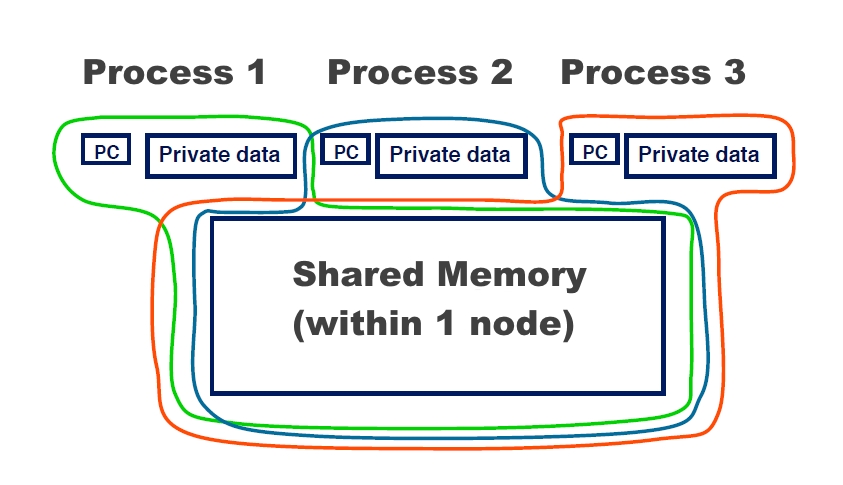Programming/OpenMP
Contents
Introduction to OpenMP
OpenMP (Open Multi-Processing) is an application programming interface (API) that supports multi-platform shared memory multiprocessing programming in C, C++, and Fortran on most platforms including our own HPC.
The programming model for shared memory is based on the notion of threads:
- Threads are like processes, except that threads can share memory with each other (as well as having private memory)
- Shared data can be accessed by all threads
- Private data can only be accessed by the owning thread
- Different threads can follow different flows of control through the same program
- each thread has its own program counter
- Usually run one thread per CPU/core
- but could be more
- can have hardware support for multiple threads per core
This programming model runs on one node but can be programmed to as a hybrid model as well with MPI.
An application built with the hybrid model of parallel programming can run on a computer cluster using both OpenMP and Message Passing Interface (MPI), such that OpenMP is used for parallelism within a (multi-core) node while MPI is used for parallelism between nodes. There have also been efforts to run OpenMP on software distributed shared memory systems.
Programming Details
OpenMP is designed for multi-processor/core, shared memory machines. The underlying architecture can be shared memory UMA or NUMA.
It is an Application Program Interface (API) that may be used to explicitly direct multi-threaded, shared memory parallelism. Comprised of three primary API components:
- Compiler Directives
- Runtime Library Routines
- Environment Variables
OpenMP compiler directives are used for various purposes:
- Spawning a parallel region
- Dividing blocks of code among threads
- Distributing loop iterations between threads
- Serializing sections of code
- Synchronization of work among threads
Programming Example
C Example
#include <stdio.h>
#include <stdlib.h>
#include <malloc.h>
/* compile with gcc -o test2 -fopenmp test2.c */
int main(int argc, char** argv)
{
int i = 0;
int size = 20;
int* a = (int*) calloc(size, sizeof(int));
int* b = (int*) calloc(size, sizeof(int));
int* c;
for ( i = 0; i < size; i++ )
{
a[i] = i;
b[i] = size-i;
printf("[BEFORE] At %d: a=%d, b=%d\n", i, a[i], b[i]);
}
#pragma omp parallel shared(a,b) private(c,i)
{
c = (int*) calloc(3, sizeof(int));
#pragma omp for
for ( i = 0; i < size; i++ )
{
c[0] = 5*a[i];
c[1] = 2*b[i];
c[2] = -2*i;
a[i] = c[0]+c[1]+c[2];
c[0] = 4*a[i];
c[1] = -1*b[i];
c[2] = i;
b[i] = c[0]+c[1]+c[2];
}
free(c);
}
for ( i = 0; i < size; i++ )
{
printf("[AFTER] At %d: a=%d, b=%d\n", i, a[i], b[i]);
}
}
Fortran Example
program omp_par_do
implicit none
integer, parameter :: n = 100
real, dimension(n) :: dat, result
integer :: i
!$OMP PARALLEL DO
do i = 1, n
result(i) = my_function(dat(i))
end do
!$OMP END PARALLEL DO
contains
function my_function(d) result(y)
real, intent(in) :: d
real :: y
! do something complex with data to calculate y
end function my_function
end program omp_par_do
Tips for programming
- Mistyping the sentinel (e.g. !OMP or #pragma opm ) typically raises no error message.
- Don’t forget that private variables are uninitialised on entry to parallel regions.
- If you have large private data structures, it is possible to run out of stack space.
- the size of thread stack apart from the master thread can be controlled by the OMP_STACKSIZE environment variable.
- Writing code that works without OpenMP too. The macro _OPENMP is defined if code is compiled with the OpenMP switch.
- Be aware The overhead of executing a parallel region is typically in the tens of microseconds range
- depends on compiler, hardware, no. of threads
- Tuning the chunk size for static or dynamic schedules can be tricky because the optimal chunk size can depend quite strongly on the number of threads.
- Make sure your timer actually does measure wall clock time. Do use omp_get_wtime()
Compilation
The program would be compiled in the following way, optional Intel compiler available too:
For C [username@login01 ~]$ module add gcc/4.9.3 [username@login01 ~]$ gcc -o test2 -fopenmp test2.c For Fortran [username@login01 ~]$ module add gcc/4.9.3 [username@login01 ~]$ gfortran -o test2 -fopenmp test2.c
Modules Available
The following modules are available for OpenMP:
- module add gcc/4.9.3 (GNU compiler)
- module add intel/compiler/64/2016.2.181 (Intel compiler)
| |
OpenMP is a library directive within the compiler and does not require any additional module to be loaded. |
Usage Examples
Batch example
#!/bin/bash #SBATCH -J openmpi-single-node #SBATCH -N 1 #SBATCH --ntasks-per-node 28 #SBATCH -o %N.%j.%a.out #SBATCH -e %N.%j.%a.err #SBATCH -p compute #SBATCH --exclusive echo $SLURM_JOB_NODELIST module purge module add gcc/4.9.3 export I_MPI_DEBUG=5 export I_MPI_FABRICS=shm:tmi export I_MPI_FALLBACK=no export OMP_NUM_THREADS=28 /home/user/CODE_SAMPLES/OPENMP/demo
[username@login01 ~]$ sbatch demo.job Submitted batch job 289552
Further Information
Specific
- https://en.wikipedia.org/wiki/OpenMP
- http://www.openmp.org/
- https://computing.llnl.gov/tutorials/openMP/
- http://fortranwiki.org/fortran/show/OpenMP
- 'Youtube - Intel Training videos'
General
- https://en.wikipedia.org/wiki/Open_MPI
- https://www.open-mpi.org/
- C Programming
- C++ Programming
- Fortran Programming
- Python Programming
| |

